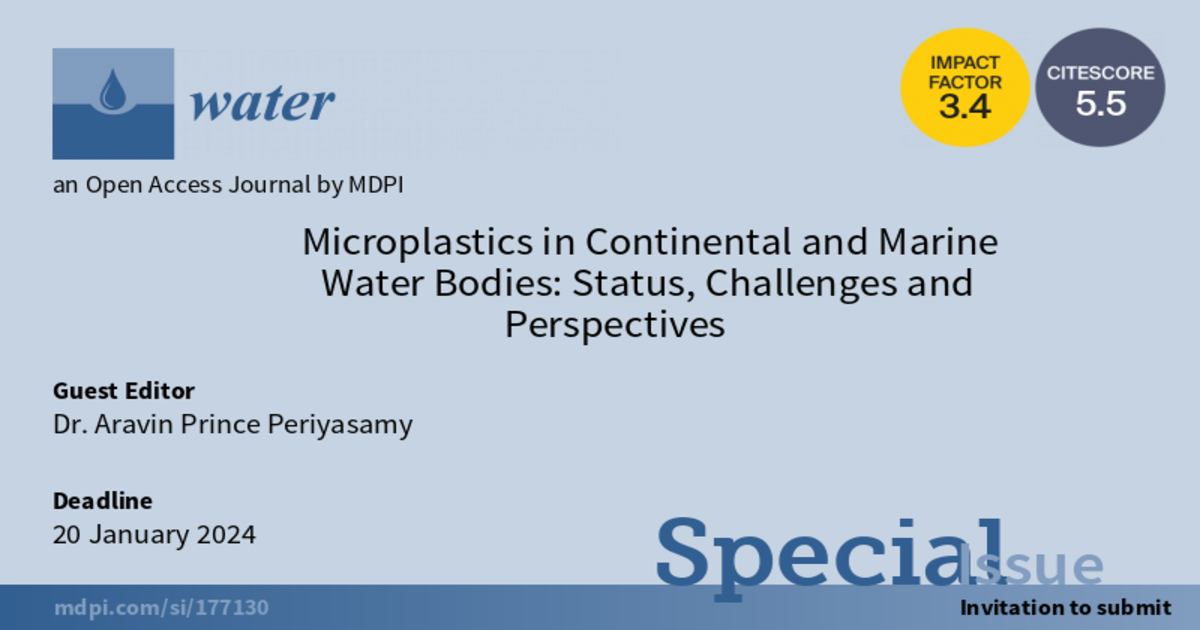Microplastics in Continental and Marine Water Bodies: Status, Challenges and Perspectives
A special issue of Water (ISSN 2073-4441). This special issue belongs to the section "Water Quality and Contamination".
Deadline for manuscript submissions: closed (20 January 2024) | Viewed by 283

Special Issue Editor
2. VTT Technical Research Center of Finland, Espoo, Finland
Interests: green chemistry; microplastics; dye removal; chromic materials; textile and polymer processing
Special Issues, Collections and Topics in MDPI journals
Special Issue Information
Dear Colleagues,
The escalation in synthetic textile, plastics, and automobile tire production and consumption can be attributed to the increase in the global population. The presence of microplastics in marine environments is anticipated to have significant impacts on various components of the marine ecosystem, including marine fish and the food chain. Microplastics have been found to exert toxic effects on aquatic organisms, such as fish, by inducing a range of physiological and behavioral abnormalities. These effects include reduced food intake, delayed growth, oxidative damage, and abnormal behavior. Microplastics are regarded as a novel form of environmental contamination and a matter of public health concern due to their variable size, ranging from one micrometer to five millimeters. The ingestion of microplastics by aquatic organisms can lead to notable disruptions in their metabolic processes. The ingestion of microplastics into the food chain can occur through the consumption of marine organisms, sea salt, and potable water.
The objective of this particular edition is to exhibit recent research endeavors that exemplify the present-day inclinations in the domain of microplastics in continental and marine water bodies, toxicity, and remediation techniques. The submission of communications, full papers, and reviews is highly encouraged. Researchers from diverse backgrounds, including academia, government, and industry, are cordially invited to participate in this global initiative.
Dr. Aravin Prince Periyasamy
Guest Editor
Manuscript Submission Information
Manuscripts should be submitted online at www.mdpi.com by registering and logging in to this website. Once you are registered, click here to go to the submission form. Manuscripts can be submitted until the deadline. All submissions that pass pre-check are peer-reviewed. Accepted papers will be published continuously in the journal (as soon as accepted) and will be listed together on the special issue website. Research articles, review articles as well as short communications are invited. For planned papers, a title and short abstract (about 250 words) can be sent to the Editorial Office for assessment.
Submitted manuscripts should not have been published previously, nor be under consideration for publication elsewhere (except conference proceedings papers). All manuscripts are thoroughly refereed through a single-blind peer-review process. A guide for authors and other relevant information for submission of manuscripts is available on the Instructions for Authors page. Water is an international peer-reviewed open access semimonthly journal published by MDPI.
Please visit the Instructions for Authors page before submitting a manuscript. The Article Processing Charge (APC) for publication in this open access journal is 2600 CHF (Swiss Francs). Submitted papers should be well formatted and use good English. Authors may use MDPI's English editing service prior to publication or during author revisions.
Keywords
- microplastics
- microfibers
- marine contamination
- wastewater
- water pollution
- human
- animal
- and ecosystem health
- food chain
Benefits of Publishing in a Special Issue
- Ease of navigation: Grouping papers by topic helps scholars navigate broad scope journals more efficiently.
- Greater discoverability: Special Issues support the reach and impact of scientific research. Articles in Special Issues are more discoverable and cited more frequently.
- Expansion of research network: Special Issues facilitate connections among authors, fostering scientific collaborations.
- External promotion: Articles in Special Issues are often promoted through the journal's social media, increasing their visibility.
- Reprint: MDPI Books provides the opportunity to republish successful Special Issues in book format, both online and in print.
Further information on MDPI's Special Issue policies can be found here.





